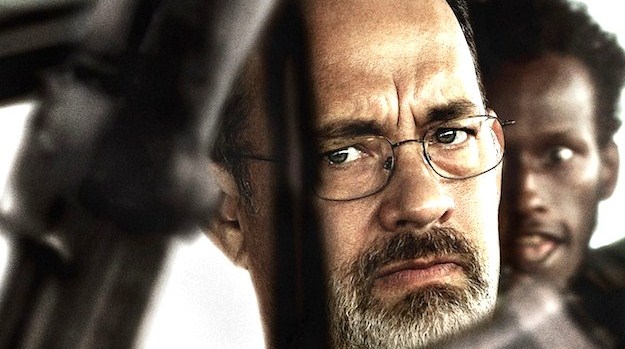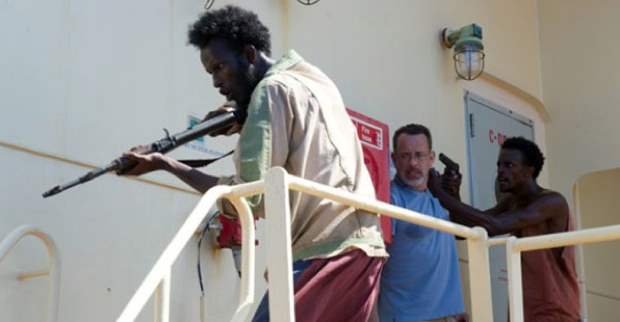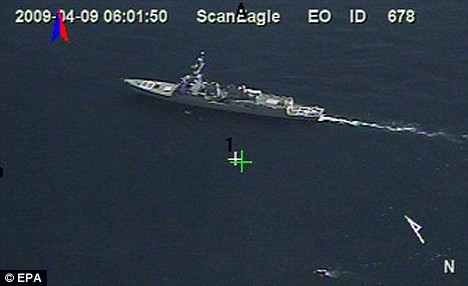Somalia's chief exports appear to be morally-ambiguous Salon articles about piracy and sophomoric evidence against libertarianism. However, it is the former topic that Captain Phillips concerns itself with, inspired by the hijacking of the Maersk Alabama container ship in 2009.
What is truth? In the end, Captain Phillips does not rise above Pontius Pilate in providing an answer, but it certainly tries using more refined instruments than irony or leaden sarcasm.
The motif of truth pervades the film. Most obviously, it is based on a "true story" and brings aboard that baggage, but it also permeates the plot in a much deeper sense. For example, Phillips and the US Navy lie almost compulsively to the pirates, whilst the pirates only really lie once (where they put Phillips in greater danger).
Notice further that Phillips only starts to tell the truth when he thinks all hope is lost. These observations become more telling when you realise that they must be based on the equivalent or "real life" testimony of the, well, liars. In this universe, deception is a weapon to be monopolised and there are few limits on what good guys can or should lie about if they believe they can save lives. You might not have noticed, but your brain did.

Even Phillip's nickname ("Irish") is a falsehood – he straight-up admits he is an American citizen.
Futhermore, there is an utterly disarming epilogue where Phillips is being treated for shock by clinically efficient medical staff. Not only will this scuttle any "blanket around the shoulders" cliché but is probably a highly accurate portrayal of what actually happens post-trauma. This echoes the kind of truth Werner Herzog aims for in his filmmaking as well his guilt-inducing duality between uncomfortable lingering and compulsive viewing.
Lastly, a starter for a meta-discussion: can a film based on real-world events even be "spoilered"? Hearing headlines on the radio before you read your newspaper hardly robs you of a literary journey...
Captain Phillips does have some quotidian problems. Firstly, the only tool for ratcheting up tension is for the Somalians to launch verbal broadsides at the Americans, with each compromise somehow escalating the situation. This technique is effective but well before the climatic rescue scene—where it is really needed—it has been subject to the most extreme diminishing returns.
(As an aside, I cannot be the first to notice the "Black Africans festooned with guns shouting incomphensively" trope – I hope it is based on a Babel-esque disorientation from miscommunication rather than anything unsavoury.)

The racist idea that Africans prefer an AK-47 rotated about the Z-axis is socially constructed.
Secondly, the US Navy acts like a teacher with an Ofsted inspector observing quietly from the corner of the classroom; far too well-behaved it suspends belief, with no post-kill gloating or even the tiniest of post-arrest congratulations. Whilst nobody wants to see the Navy overreact badly to other military branches getting all the glory, nobody wants to see a suspiciously bland recruitment vehicle either.
Paradoxically, this hermetic treatment made me unduly fascinated by them as if they were part of some military "uncanny valley". Two quick observations:
- All US—Somali interactions are recorded by a naval officer. No doubt a value-for-money defense against a USS Abu Ghraib, but knowing the plot is based on factual events, it was perhaps a little too Baudrillardian to ponder how the presence of the Navy's cameras in a scene actually lent weight to the film's version of events, crucially without me even knowing whether the parallel "real-life" footage is verifiable or even exists.
- The navigational computers not only seem to require lines to drawn repeatedly between points of interest, but the Maersk Alabama's arbitrary relabelling as MOTHERSHIP seems to imply that an officer could humourously rename a radar contact to something unbecoming of a 12A classification.

The drone footage: I'd love to write an essay about how Call of Duty might have influenced (or even be) cinema.
Finally, despite the title, the film is actually about two captains; the skillful liar Phillips and ... well, that's the real problem. Whilst Captain Muse is certainly no caricatured Hook, we are offered little depth beyond a "You're not just a fisherman" faux-revelation that leads nowhere. I was left inventing reasons for his akrasia so that he made any sense whatsoever.
One could charitably argue that the film attempts to stay objective on Muse, but the inability for the film to take any obvious ethical stance actually seems to confuse and then compromise the narrative. What deeper truth is actually being revealed? Is this film or documentary?
Worse still, the moral vacuum is invariably filled by the viewer's existing political outlook: are Somali pirates victims of circumstance who are forced into (alas, regrettable) swashbuckling adventures to pacify plank-threatening warlords? Or are they violent and dangerous criminals who habour an irrational resentment against the West, flimsily represented by material goods in shipping containers?
Your improvised answer to this Rorschach test will always sit more haphazardly in the film than any pre-constructed treatment ever could.
6/10
